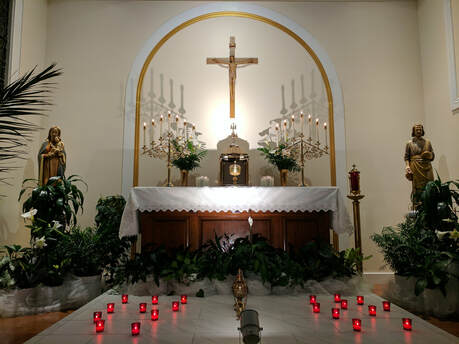 Doors open and lights on: our 24-hour adoration chapel
Doors open and lights on: our 24-hour adoration chapel In the more ancient tradition, Lent is progressive. It begins with Septuagesima three weeks before Ash Wednesday, followed by four weeks of Lent proper, then two weeks of Passiontide (beginning today) and finally the Paschal Triduum. Holy Saturday, the last day of our 70-day preparation for Easter, is marked by emptiness and almost total silence: no liturgical prayers, altars and churches stripped, and tabernacle doors gaping ajar, empty. The Crucifix is draped in purple from today until Good Friday, and statues covered until the Easter Vigil. Today is also known as “Judica” Sunday, because the introit or entrance verse comes from Psalm 42, the same verse used for the Prayers at the Foot of the Altar. “Judica me Deus, et discerne causam meam de gente non sancta.” Vindicate me, O God, and defend my cause against a godless people. These words stay on Our Savior’s lips throughout his Sacred Passion. Tu Deus fortitudo mea, “you O God are my strength.” In his masterful Passion of the Christ, Gibson puts these words on Jesus’ agonized lips as he faces his trial and execution.
“I Am”
Our Gospel is taken from St. John Chapter 8, which begins with the woman taken in adultery. Jesus had pardoned the woman in the verses leading up to this Sunday’s reading, but he also commands her to sin no more. This act of forgiving sin, which we Catholics take for granted every time we enter a confessional, drove the Pharisees and legal scholars to fury against Jesus. They accuse him of everything under the sun: You are a Samaritan (an apostate). You are insane. You are possessed. Jesus patiently, but firmly, corrects their absurd charges, but finally speaks the one word that is sure to get him killed, the unspeakable tetragrammaton: I AM. It is this Name that Moses heard on Sinai, the name of Yahweh. “Before Abraham came to be,” Christ says, “I AM.” Thus He declares his eternity and his divinity. He leaves no room for equivocation: either he is a madman, claiming to be divine, or he is all that he says he is: the eternal and consubstantial Son of God. The Jews picked up stones to kill him.
God’s Shame
Jesus abscondit se. Consider the indignity of the Christ having to hide himself. The Lord of Lords and King of Kings, having pronounced his divine Name, must dodge his enemies like a common thief and hide down some dark alley. He doesn’t have to hide himself, of course, but in obedience to his Father’s will, he accepts the humiliation of every man who must run and hide from his enemies. Our frailty must often hide or flee certain evils we cannot prevent--misunderstandings, social awkwardness, and the consequences of our own miserable sins. Every morning when we put on clothing, we hide our bodies from shame and sin. When we enter the confessional we hide our sins from others and hide our face from the priest. And yet, we long to be free of shame, for a day when we will no longer have to run and hide. But that day is not yet. In this life, as we must endure shame, let us endure it with Him. Our Redeemer’s shame, freely chosen, heals our shame.
Keeping the Lights On
Tourists flock to our city to tour the sex districts and Pride Parades, which pride themselves on their shamelessness. “We have nothing to hide” men say, prancing naked down Castro Street. And yet, the newspapers shame us with pictures of homeless defecating in our streets and camping in front of apartments that rent for $6000 a month. The poverty in our wealthiest cities testifies to original sin, that something is fundamentally wrong with humanity. Many people are desperately trying to fix our problems, but no one has finally succeeded. San Francisco, like any wealthy city, desperately needs Christ, who alone can heal our essential shame. The powers of darkness have convinced most people in our city that we don’t need God: all we need is Google. But technology and the money with which it floods this city is not enough. Every inhabitant of our city needs the Word of God, and the Sacraments of God. And when they come back to God, we are here for them. At least once a month someone comes to Star of the Sea from the wasteland of agnosticism. They come because the doors are open, and the Eucharist blazes from the altar. A Russian orthodox priest last week told me how grateful he is to see our large and prominent church open with the Holy Sacrament shining out across Geary Boulevard. “Christ is blessing the entire city from your altar,” he said. We’ve got to keep the church doors open and the lights on. The human soul needs more than what we can see and taste. We need God. The Church today faces real enemies, men and women who have declared that (as an attorney in Orange County told a prelate) “we will not stop until the Catholic Church is destroyed.” They cannot destroy what God sustains, but they can certainly infiltrate it with poison from within and batter it with lawsuits from without. This Sunday I will ask you to make a gift to the Archdiocese in its Annual Appeal. Our parish goal is $82,000, and many of us are able to make a 1% gift, or $820. Why do we give to the Church beyond our own parish? We give so that the Archbishop can keep the doors open and the lights on in all three counties of Marin, San Francisco, and San Mateo. God will not be silenced, if we can help it.


 RSS Feed
RSS Feed